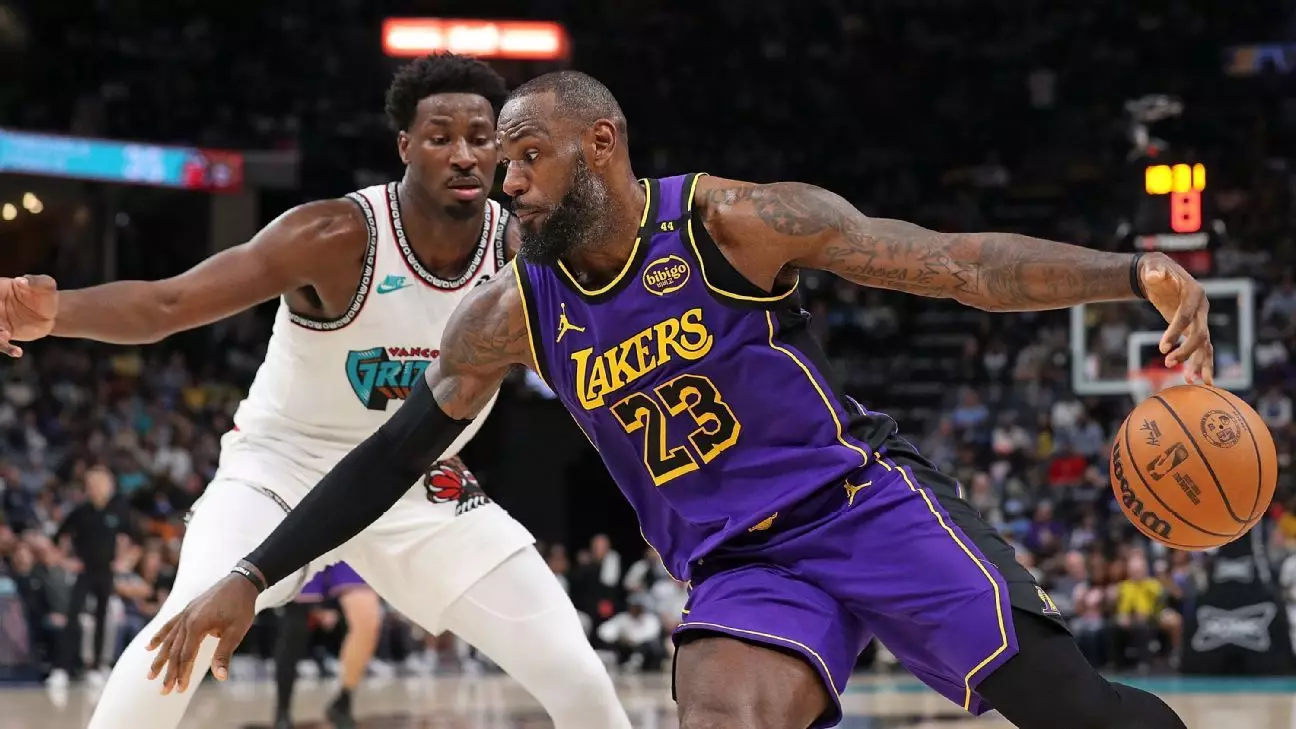Grizzlies Outshine Lakers: A Tale of Effort and Accountability
On a crisp Wednesday evening in Memphis, the Grizzlies demonstrated their basketball mastery with a dominant 131-114 win over the Los Angeles Lakers. This wasn’t just another game on the schedule; it was an exhibition of teamwork, strategy, and resilience. As fans cheered and players hustled, this match underscored the intricate ballet of player performance, coaching decisions, and team spirit. It wasn’t merely about the scoreboard; it was a visceral clash of determination and skill unfolding in real-time.
Desmond Bane, ever the live wire for the Grizzlies, added a touch of humor by playfully interrupting teammate Scotty Pippen Jr.’s post-game interview. His joy was infectious as he lauded Pippen’s gritty play, particularly his impressive steal from none other than LeBron James. Bane’s lighthearted jab at the “old man” James encapsulated the evening’s essence—youthful enthusiasm triumphing over seasoned experience in a thrilling display of athleticism.
Meanwhile, the Lakers found themselves grappling with frustration despite LeBron James’s awe-inspiring 39-point performance. As one of basketball’s living legends, James defied age and expectations, reminding everyone of his unparalleled talent. However, his brilliance stood in stark contrast to his teammates’ struggles, casting a shadow over what should have been a night of celebration for individual greatness in a team sport.
Key Takeaways
- The Grizzlies’ victory was defined by teamwork and youthful energy.
- LeBron James’s individual performance highlighted the Lakers’ reliance on him.
- The game underscored the importance of cohesive strategies and accountability.
A Coach’s Dilemma: Choice and Consequence
Lakers’ coach JJ Redick faced scrutiny as he navigated his new role amidst skepticism. Following a disappointing road trip that left them at 1-4, Redick’s frustration bubbled to the surface during postgame interviews. His decisions came under fire, especially the limited playtime for D’Angelo Russell in the second half. This wasn’t just a disciplinary move but a strategic gamble aimed at reigniting the team’s competitive edge. Yet, these decisions highlighted deeper issues within the team’s dynamics.
Redick’s curt response to questions about effort pointed to a larger problem: a pervasive lack of intensity among his players. While collaboration in practice is crucial for any coach’s success, Redick’s visible frustration suggested an urgency that hadn’t yet taken root within the team. It revealed an ongoing struggle with leadership as he attempted to instill discipline and accountability amid chaos. The task before him was not just tactical adjustments but fostering a culture of responsibility.

Struggles in the Shadows of Greatness
The statistics told a sobering story for the Lakers as they struggled under pressure despite James’ spotlight-stealing performance. D’Angelo Russell, once considered a scoring asset, faltered with his shooting and failed to make significant impacts on the court. Likewise, Dalton Knecht’s promotion to starter due to injuries resulted in a forgettable outing with poor shooting stats. Key players like Austin Reaves and Gabe Vincent also didn’t rise to expectations, highlighting larger issues within the team.
This patchwork performance underscored an alarming lack of cohesion and synergy within the Lakers squad. Coach Redick’s attempts to marry intensity with accountability seemed dwarfed by underperformance woes. With essential players like Anthony Davis and Rui Hachimura sidelined, the Lakers appeared vulnerable against a Grizzlies team playing with both energy and discipline. The defeat pointed to deeper systemic issues requiring immediate attention if they hoped to remain competitive.
The Lakers’ defensive lapses have become glaringly apparent as they’ve allowed over 130 points in consecutive games. This troubling trend raised questions about their defensive capabilities and overall strategy. LeBron himself acknowledged their inconsistency, citing lapses in effort and attention to detail that previously defined their franchise identity. Their ranking near the bottom in defensive efficiency paints a dire picture of their current form.
An analysis of their failures reveals recurring themes: ineffective paint defense, allowing offensive rebounds, and poor transition defense management. These compounded weaknesses heightened pressure on an already struggling offensive lineup. This juxtaposition—between Grizzlies’ exuberant success and Lakers’ disarray—serves as an insightful case study into competitive sports dynamics. While Memphis embraces its burgeoning potential, Los Angeles must urgently reassess its strategy and collective mindset.

Final Thoughts
The contrasting narratives from this game offer much more than just another sports story; they present lessons in teamwork and leadership under pressure. For Memphis Grizzlies fans, witnessing such spirited performances promises exciting future prospects as their young squad continues to grow together cohesively under skilled guidance. On the other hand, Lakers fans face uncertainty as their beloved team struggles with fundamental issues needing immediate resolution if they aim to reclaim past glories.
As both teams progress through their respective journeys this season—one climbing towards potential while another seeks redemption—their paths will require introspection coupled with decisive action plans tailored specifically towards achieving set goals efficiently without compromising foundational values ingrained within each organization’s ethos over years gone by till date!
Grizzlies
Lakers
Basketball
Teamwork
Accountability


Leave a Reply